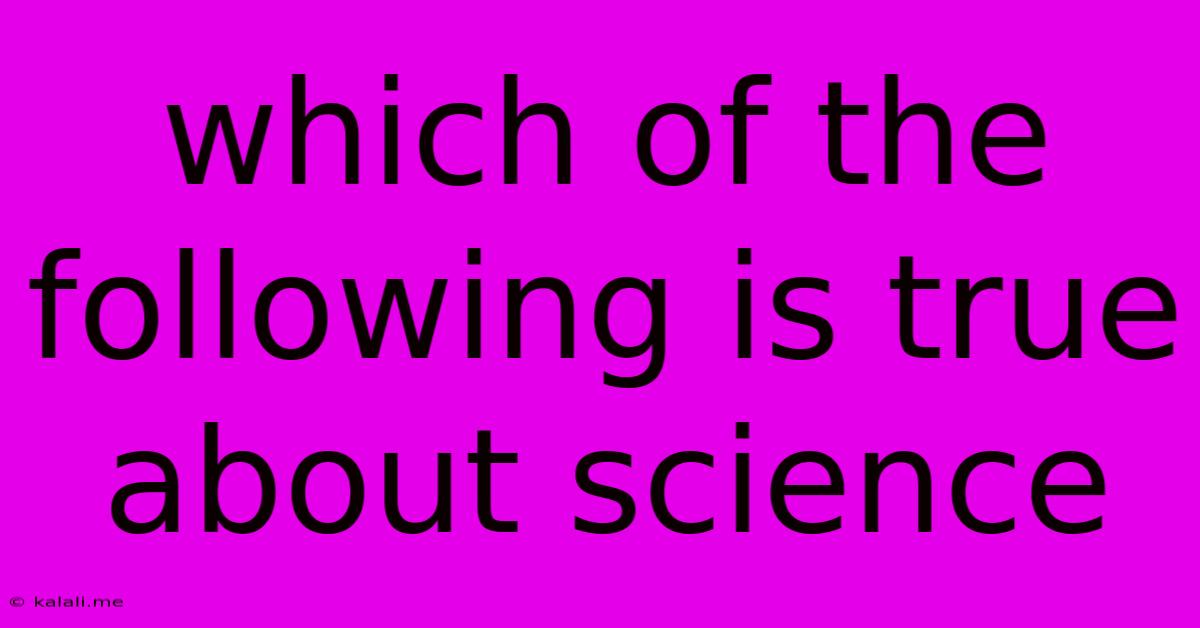Which Of The Following Is True About Science
Kalali
Jun 15, 2025 · 3 min read

Table of Contents
Which of the Following is True About Science? Deconstructing the Nature of Scientific Inquiry
Science. The word conjures images of bubbling beakers, complex equations, and groundbreaking discoveries. But what exactly is science? This seemingly simple question opens the door to a deeper understanding of how we acquire knowledge about the world around us. This article will explore the nature of science, clarifying common misconceptions and highlighting its core principles.
What is Science? A Definition and its Characteristics
Science is a systematic enterprise that builds and organizes knowledge in the form of testable explanations and predictions about the universe. It's a process, not a body of facts, constantly evolving and refining our understanding through observation, experimentation, and rigorous analysis. Key characteristics of science include:
- Empirical Evidence: Science relies on observable and measurable evidence. Claims must be supported by data collected through experiments or observations. This distinguishes it from purely philosophical or theological arguments.
- Testability: Scientific hypotheses and theories must be testable. This means it must be possible to design experiments or observations that could potentially disprove the claim. Untestable ideas are outside the realm of science.
- Falsifiability: A core tenet of science is that any scientific claim must be potentially falsifiable. This doesn't mean it is false, but that it's possible to conceive of evidence that would contradict it. A theory that explains everything explains nothing.
- Replicability: Scientific findings must be replicable. Other scientists should be able to conduct the same experiment or observation and obtain similar results. This ensures the reliability and validity of the findings.
- Objectivity: While scientists are human and subject to biases, the scientific method strives for objectivity. This involves minimizing bias through rigorous experimental design, peer review, and replication.
- Peer Review: Before publication in reputable journals, scientific work undergoes rigorous scrutiny by other experts in the field. This process helps to ensure the quality, validity, and integrity of the research.
Common Misconceptions about Science:
Several misconceptions frequently cloud the understanding of science:
- Science proves things definitively: Science doesn't "prove" things in the absolute sense. Instead, it builds increasingly robust explanations based on accumulating evidence. Scientific theories are subject to revision or even rejection in light of new data.
- Science is purely objective: While striving for objectivity, science is conducted by humans, who are inevitably influenced by their biases and perspectives. The process of peer review helps mitigate this, but complete objectivity is an ideal, not always achievable.
- Science provides all the answers: Science addresses questions about the natural world, but it doesn't provide answers to ethical, moral, or aesthetic questions. These fall outside the scope of scientific inquiry.
The Scientific Method: A Cyclical Process
The scientific method isn't a rigid, linear sequence but rather a cyclical process of observation, hypothesis formulation, experimentation, analysis, and conclusion. This iterative nature allows for refinement and advancement of scientific understanding over time. The process typically involves:
- Observation: Noticing a phenomenon or pattern.
- Question: Formulating a specific question about the observation.
- Hypothesis: Proposing a testable explanation for the observation.
- Prediction: Making a prediction based on the hypothesis.
- Experiment: Designing and conducting an experiment to test the prediction.
- Analysis: Analyzing the data collected from the experiment.
- Conclusion: Drawing conclusions based on the data analysis, supporting or refuting the hypothesis.
In conclusion, understanding what constitutes true science requires appreciating its reliance on empirical evidence, testability, falsifiability, replicability, and the inherent limitations of human objectivity. The scientific method, with its iterative nature, is the cornerstone of scientific inquiry, constantly refining our understanding of the universe. It’s a dynamic and ever-evolving process, constantly striving for a more accurate and complete picture of reality.
Latest Posts
Latest Posts
-
What Is The First Step In Planning
Jun 15, 2025
-
Which Of The Following Is True Of Qualitative Research
Jun 15, 2025
-
Number Of Chromosomes In Fruit Fly
Jun 15, 2025
-
Parts Of 4 Stroke Petrol Engine
Jun 15, 2025
-
Conversion Of Voltage Source To Current Source
Jun 15, 2025
Related Post
Thank you for visiting our website which covers about Which Of The Following Is True About Science . We hope the information provided has been useful to you. Feel free to contact us if you have any questions or need further assistance. See you next time and don't miss to bookmark.